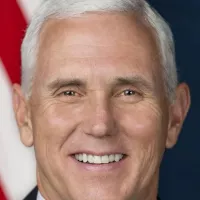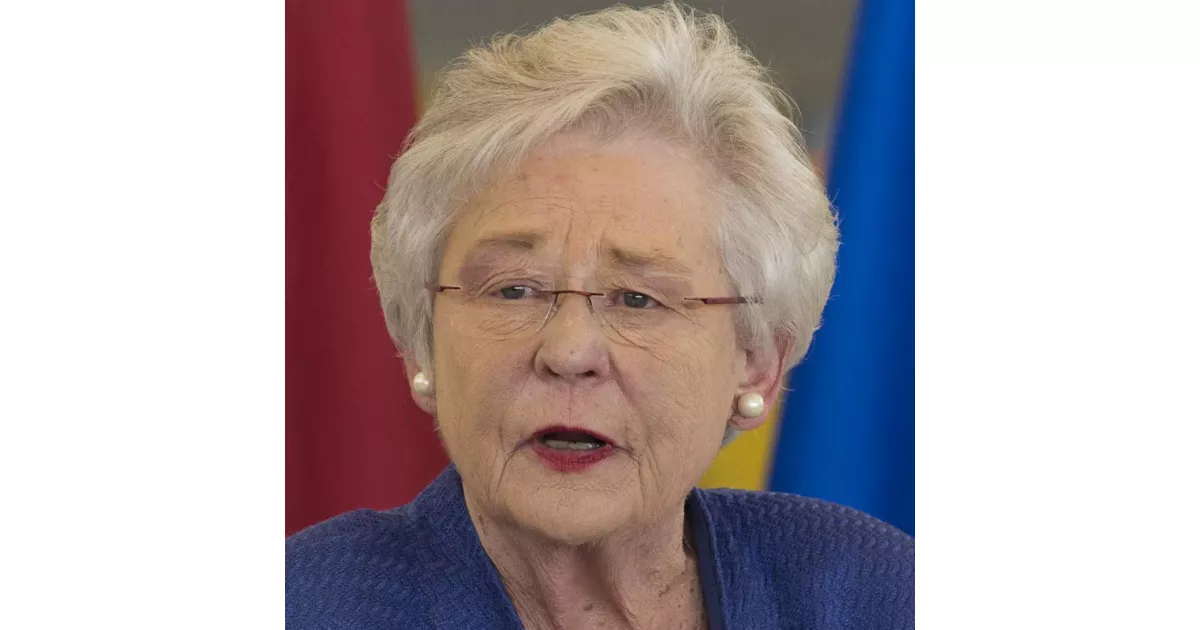"Kay Ellen Ivey is the 54th governor of Alabama, serving since 2017. She switched from the Democratic to the Republican party in 2002. Prior to becoming governor, she served as the 38th Alabama state treasurer and 30th lieutenant governor of Alabama."
1967: Move to California and Teaching Career
After her first marriage, Kay Ivey moved to California in 1967 and worked as a high school teacher for several years.
1967: Lurleen Wallace's Tenure as Governor
Lurleen Wallace, the first female governor of Alabama, served for about 16 months starting in 1967.
1967: Blackface Skit at Auburn University
While a student at Auburn University, Kay Ivey participated in a blackface skit in 1967.
1968: End of Lurleen Wallace's Tenure
Lurleen Wallace's time as governor of Alabama ended in 1968 due to her death from cancer.
1979: Appointment to State Cabinet
Kay Ivey was appointed to serve in the state cabinet by Governor Fob James in 1979.
1980: Reading Clerk of the Alabama House of Representatives
Kay Ivey served as the reading clerk of the Alabama House of Representatives between 1980 and 1982.
1982: Unsuccessful Run for State Auditor
Kay Ivey ran for State Auditor as a Democrat but was unsuccessful in 1982.
1982: Assistant Director of the Alabama Development Office
Kay Ivey served as Assistant Director of the Alabama Development Office between 1982 and 1985.
1985: Director of Government Affairs and Communications
Kay Ivey became the Director of Government Affairs and Communications for the Alabama Commission on Higher Education in 1985.
1990: Inception of the PACT Program
The Prepaid Affordable College Tuition (PACT) program was launched in 1990.
1998: End of Tenure at Alabama Commission on Higher Education
Kay Ivey served as Director of Government Affairs and Communications for the Alabama Commission on Higher Education until 1998.
2000: Stock Market Downturn Impacts PACT
The PACT program was impacted by a stock market downturn in 2000.
2002: Switching Political Parties
Kay Ivey switched from being a conservative Southern Democrat and became a member of the Republican Party in 2002.
2002: Election as State Treasurer
Kay Ivey was elected as state treasurer in 2002, defeating Stephen Black in the general election.
2003: Becoming Alabama State Treasurer
Kay Ivey served as the 38th Alabama state treasurer starting in 2003.
2003: Start of Tenure as State Treasurer
Kay Ivey took office as state treasurer in 2003.
2006: Re-election as State Treasurer
Kay Ivey was re-elected as state treasurer in 2006, defeating Democrat Steve Segrest.
2008: Financial Crisis Impacts PACT
The PACT program faced financial unsustainablility due to the stock market downturn in 2008, combined with rising tuition costs.
2009: Announcement of Candidacy for Governor
Kay Ivey announced her candidacy for the Republican nomination for governor in the 2010 elections.
March 2010: Candidacy for Lieutenant Governor
Kay Ivey ended her campaign for governor and decided to run for lieutenant governor in March 2010.
June 2010: Winning the Republican Nomination for Lieutenant Governor
Kay Ivey won the Republican nomination for lieutenant governor in June 2010, defeating State Senator Hank Erwin and schoolteacher Gene Ponder.
November 2010: Election as Lieutenant Governor
Kay Ivey defeated Democratic incumbent Lieutenant Governor Jim Folsom Jr. in the November 2010 elections.
2010: Consideration for Gubernatorial Candidacy
Kay Ivey's name was mentioned as a potential candidate for governor in 2010.
2011: Becoming Lieutenant Governor of Alabama
Kay Ivey became the 30th lieutenant governor of Alabama in 2011.
November 2014: Re-election as Lieutenant Governor
Kay Ivey won re-election as lieutenant governor in November 2014, defeating Democratic nominee James C. Fields.
February 2017: Jeff Sessions' Resignation
Jeff Sessions resigned from his position as U.S. Senator in February 2017 to become U.S. Attorney General.
April 10, 2017: Becoming Governor of Alabama
Kay Ivey was sworn in as governor of Alabama on April 10, 2017, following the resignation of Robert J. Bentley.
April 2017: Judicial Override Bill
In April 2017, Kay Ivey signed a bill that prevents judges from overriding a jury's recommendation of a life sentence in capital murder cases and imposing the death penalty.
May 2017: Religious Freedom Adoption Bill Signed
In May 2017, Ivey signed House Bill 24 into law. This bill allowed religious adoption agencies the right to refuse placement of children with LGBTQ families.
September 2017: Announcement of Candidacy for Governor
In September 2017, Kay Ivey announced her decision to run for a full term as governor in the 2018 gubernatorial election.
December 12, 2017: Rescheduling of the Special Election
Kay Ivey, after succeeding Robert Bentley as governor, rescheduled the special election for December 12, 2017.
2017: Becoming Governor of Alabama
Kay Ivey became the 54th governor of Alabama in 2017, following the resignation of her predecessor.
March 2018: Medicaid Work Requirements
In March 2018, Ivey announced Alabama's intention to pursue work or job-training requirements for Medicaid eligibility, impacting approximately 75,000 able-bodied adults with limited incomes. Her rationale was to reduce taxpayer burden and prioritize Medicaid resources for those in dire need.
April 6, 2018: Exemption of Economic Development Professionals from Lobbyist Registration
On April 6, 2018, Ivey signed a bill that exempted economic development professionals from registering as lobbyists under Alabama's ethics law. Ivey defended the bill, stating it would help Alabama compete with other states in attracting job-creating investments and maintain low unemployment rates.
May 2018: Authorization of Guns in Schools
In May 2018, Ivey authorized Alabama school administrators to carry guns on school grounds if they met the requirements of the Alabama Sentry Program. This authorization allowed them to use lethal force to protect students, staff, and visitors from armed threats. Ivey's decision, prompted by concerns over school shootings nationwide, drew criticism from members of both political parties who questioned its effectiveness and practicality.
August 2018: Response to Alabama Unborn Child Protection from Dismemberment Act Ruling
Following an 11th Circuit Court of Appeals decision to block the Alabama Unborn Child Protection from Dismemberment Act in August 2018, Ivey, while expressing disappointment, remained resolute in her anti-abortion stance. She viewed the ruling as justification for conservative Supreme Court justices, particularly in light of Brett Kavanaugh's confirmation.
October 2018: Meeting with Vice President Pence
During Vice President Mike Pence's visit to Alabama for a National Republican Senatorial Committee event in October 2018, Ivey met with him. Their discussion centered around providing assistance to Alabamians impacted by Hurricane Michael.
October 2018: Formation of STEM Advisory Council
In October 2018, Ivey announced the creation of an advisory council to explore improvements to science, technology, engineering, and math (STEM) education in Alabama schools. The council, composed of educators and representatives from government, business, and industry, aimed to address the anticipated high demand for STEM-related jobs in the coming decade and provide Ivey with a report by the year's end.
2018: Special Election Scheduling Controversy
Governor Bentley scheduled a special election for 2018 to replace Jeff Sessions, instead of holding it sooner, which caused controversy.
2018: First Full Term as Governor
Kay Ivey won her first full term as Governor of Alabama in 2018 against Democratic nominee Walt Maddox.
2018: Gubernatorial Election
The gubernatorial election that Kay Ivey ran in took place in 2018.
May 15, 2019: Passage of Restrictive Abortion Law (HB 314)
On May 15, 2019, Ivey signed the highly restrictive House Bill 314 into law. This bill aimed to criminalize abortion in Alabama from November 2019 onward, with limited exceptions only when the mother's life was in danger or the fetus was deemed nonviable. Notably, it did not include exceptions for rape or incest. The law, which directly challenged the Roe v. Wade precedent, was met with immediate legal challenges.
September 20, 2019: Lung Cancer Diagnosis and Treatment
Ivey received an outpatient treatment for lung cancer at the University of Alabama at Birmingham on September 20, 2019. Expressing her faith, she conveyed confidence in God's plan for her life.
November 2019: Federal Injunction Against Restrictive Abortion Law
Shortly before the restrictive abortion law (HB 314) was to take effect in November 2019, a federal judge issued an injunction, halting its implementation. Ivey and Alabama Attorney General Steve Marshall expressed confidence that the Supreme Court would overturn the injunction upon appeal.
2019: Blackface Skit Controversy
When questioned about her participation in the 1967 blackface skit, Kay Ivey initially denied it but later admitted it when a recording surfaced.
January 2020: Cancer-Free Declaration
By January 2020, Ivey was declared free of cancer. Her cancer, diagnosed at Stage I, had responded effectively to radiation treatment.
March 5, 2020: Nathaniel Woods Execution and Public Response
On March 5, 2020, Nathaniel Woods was executed. The execution sparked public protests, with some directly confronting Ivey and calling her a "murderer." Ivey defended her stance, stating her belief in Woods's direct involvement in the murder of three police officers and referring to him as a "known drug dealer."
March 13, 2020: State of Emergency Declaration
Responding to the COVID-19 pandemic, Ivey declared a state of emergency in Alabama on March 13, 2020.
March 2020: Execution of Nathaniel Woods
Kay Ivey allowed the execution of Nathaniel Woods to proceed in March 2020. Woods' conviction and death sentence for allegedly orchestrating the murders of three police officers were highly controversial, with many believing he was innocent.
2020: Campaign and Re-election
During her campaign for re-election, Ivey released an advertisement promoting the unsubstantiated conspiracy theory that the 2020 presidential election had been unfairly taken from Donald Trump. Ivey secured victory in the Republican primary and proceeded to win the general election with 67.4% of the votes cast.
April 2021: Ban on Transgender Girls in Women's Sports
In April 2021, Ivey signed HB 391, banning transgender girls from participating in women's sports in Alabama. The bill, which passed with significant support in both the House and Senate, prohibits K-12 sports teams from joining trans-inclusive athletic events.
May 2021: Ban on Vaccine Passports
In May 2021, Ivey implemented a ban prohibiting businesses and public institutions in Alabama from mandating proof of COVID-19 vaccination for access to their facilities or services.
June 2021: Re-election Campaign Announcement
In June 2021, Ivey's office formally announced her decision to seek a second full term as governor. By the close of the candidate qualification period, she faced 14 challengers, with eight competing against her in the Republican primary.
July 2021: Vaccination Plea
Amidst ongoing COVID-19 transmission, Ivey publicly implored Alabamians to get vaccinated in July 2021. She attributed the continued spread of the virus to those who were unvaccinated.
July 2021: Amicus Brief Filing
In July 2021, Ivey, alongside eleven other governors and 23 attorney generals, filed an amicus brief. This action supported a lawsuit by the Jackson Women's Health Organization, challenging a Mississippi bill that sought to ban abortions after 15 weeks of gestation.
September 2021: Prison Funding Bill
Ivey signed a bill into law in September 2021 that allocated COVID-19 relief funds towards the construction of new prisons in Alabama.
October 2021: Defiance of Federal Vaccine Mandates
In October 2021, Ivey directed state agencies in Alabama to disregard federal vaccine requirements.
2021: Honorary Doctorate from Jacksonville State University
Kay Ivey received an honorary Doctor of Letters from Jacksonville State University in 2021.
March 2022: Constitutional Carry Law Enacted
In March 2022, Ivey signed House Bill 272, also known as constitutional carry, into law. This legislation removed the requirement for individuals to obtain a permit to carry concealed handguns. Ivey framed this as a measure to uphold Second Amendment rights and contrast Alabama with states she perceived as hindering law-abiding gun owners.
April 2022: Gender-Affirming Care Ban and Bathroom Bill
In April 2022, Ivey signed two bills into law addressing transgender issues. One prohibits doctors from providing gender-affirming medical care to individuals under 19, with penalties including imprisonment and fines. The other mandates that students use bathrooms corresponding to their sex assigned at birth. This bill was amended to restrict discussions on sexual orientation and gender identity in elementary schools, echoing Florida's Parental Rights in Education Act.
July 2022: Overturning of Roe v. Wade
Following the Supreme Court's decision to overturn Roe v. Wade in July 2022, Ivey issued a statement expressing her satisfaction. She stated that their "prayers had been answered" and conveyed her pride as a governor, Christian, and woman in witnessing the reversal of what she deemed a "misguided and detrimental decision."
2022: Re-election as Governor
Kay Ivey was re-elected as Governor of Alabama in 2022, defeating Democratic nominee Yolanda Flowers.
January 2023: Transparency Executive Order and Amicus Filing
In January 2023, shortly after commencing her second term, Ivey signed an executive order promoting transparency in state government. This order mandates timely responses from agencies to public records requests. In the same month, amidst a legal dispute between the Alabama Department of Transportation (ALDOT) and the Baldwin County Bridge Company, ALDOT obtained an emergency order to block the release of communications between its director, John Cooper, and Ivey's office. Cooper, invoking "executive privilege," aimed to withhold these records from the Montgomery County Circuit Court. Ivey subsequently signed an amicus curiae brief supporting Cooper's efforts to suppress the release of the communication records involving her office. Notably, this signing occurred within a week of the transparency executive order taking effect.
March 2024: Ban on Divisive Concepts in Education
Ivey signed SB 129 in March 2024, a bill that prohibited public educators from promoting or requiring students to adopt "divisive concepts" and restricted the allocation of public funds for DEI initiatives. Ivey expressed support for the state's diversity but aimed to counter what she perceived as a liberal political agenda on college campuses that conflicted with the beliefs of most Alabamians.
May 2024: Support for Education Trust Fund Budget
In May 2024, Ivey endorsed the Education Trust Fund budget approved by the Alabama Legislature. She commended the budget for strategically investing in various educational areas and initiating important endeavors such as the Alabama School of Healthcare Sciences.
Mentioned in this timeline

Donald John Trump is an American politician media personality and...
California is a U S state on the Pacific Coast...

The stock market is where buyers and sellers trade stocks...

Michael Richard Pence is an American politician and lawyer He...

Brett Kavanaugh is an American lawyer and jurist who currently...
Medicaid is a joint federal and state government program providing...
Trending

7 minutes ago Baiul, Kerrigan, and Chen Revisit Historic 1994 Olympics Photo: A Nostalgic Reunion
8 minutes ago Omaha Braces for Winter Storm: Schools and Businesses Alter Schedules

8 minutes ago Prince Harry Uses Intermediary to Contact Prince William; Relations Remain Strained
8 minutes ago Mason Thames' New Comedy with Peter Dinklage Receives Positive Reviews; Dominates Netflix.

1 hour ago Clara Tauson Dominates Linette in Dubai, Secures WTA 1000 Quarterfinal Spot

1 hour ago Pegula Defeats Jovic, Advances to Dubai Quarterfinals; Set to Face Tauson
Popular

Jesse Jackson is an American civil rights activist politician and...
Randall Adam Fine is an American politician a Republican who...

Pam Bondi is an American attorney lobbyist and politician currently...

Barack Obama the th U S President - was the...

Martin Luther King Jr was a pivotal leader in the...

Ken Paxton is an American politician and lawyer serving as...
